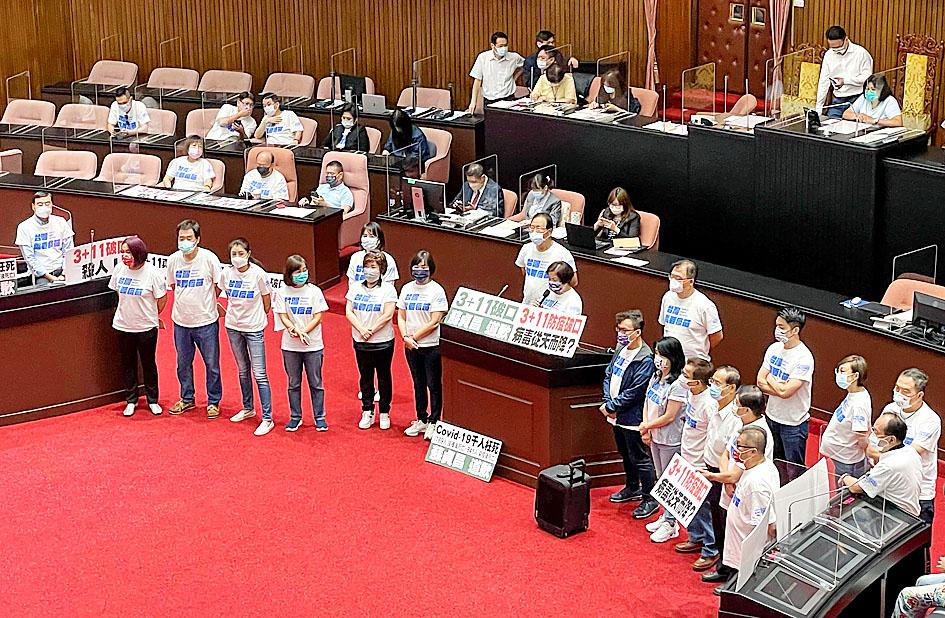An increased defense budget, improving people’s livelihoods and pushing for sustainable development were among the items Premier Su Tseng-chang (蘇貞昌) presented in a written report to the Legislative Yuan yesterday.
Frequent Chinese military incursions into Taiwan’s air defense identification zone have destabilized regional security, Su wrote in the report.
“Therefore our armed forces must monitor these actions and prepare for contingencies,” the report said. “We must have the resolve to defend our nation, build up stronger armed forces and unite all Taiwanese.”

Photo: Liu Hsin-de, Taipei Times
“We must show the international community that we are standing up for ourselves,” it said. “Only if we help ourselves will other countries come to our aid in a time of need.”
The defense budget for next year is a record NT$470 billion (US$16.95 billion), it said.
The Executive Yuan last week submitted to the legislature for approval amendments to increase spending to NT$240 billion over five years on arms procurement for the navy and air force, the report said.
Taiwan’s fleet of 141 US-made F-16A/B fighters are being upgraded to F-16Vs, with Taiwan’s first F-16V wing to be commissioned in November to bolster the nation’s strategic air defense, the report said.
To improve people’s livelihoods, the government is to allocate more than NT$86 billion to help parents raise children — a sixfold increase from 2016 — Su wrote.
Subsidies for families raising a child last month were raised to NT$3,500 per month, up from NT$2,500, and they are to rise to NT$5,000 by August next year, he wrote, adding that a target to install air-conditioners in all classrooms by March next year would be met.
Taiwan has filed an application to join the Comprehensive and Progressive Agreement for Trans-Pacific Partnership (CPTPP), the report said.
“We are able to comply with the high standards under the international trading framework, and our government is taking steps to seek support from CPTPP member nations,” it said.
“Joining would enable Taiwan to expand its exports and attract more foreign investment, thereby elevating the nation’s competitiveness,” it said. “We are ready to contribute to economic growth in the region, so we can create win-win situations for all members of the trade group.”
Regarding sustainable development, it said that production of COVID-19 vaccines in Taiwan is vital, as they are a strategic product.
“If a country cannot produce its own vaccines, it will be forever subordinate to others,” the report said. “Taiwan is one of a few countries in the world with the capability to produce its own vaccines, and the government will continue to encourage biotechnology and healthcare development.”
Taiwan will work diligently to be a key player in the worldwide supply chain for biotechnology and pharmaceutical products, it said, adding that the Executive Yuan has proposed a bill for the legislature to consider aimed at providing more support and incentives for the nation’s biomedical and pharmaceutical industries.

A decision to describe a Chinese Ministry of Foreign Affairs statement on Singapore’s Taiwan policy as “erroneous” was made because the city-state has its own “one China policy” and has not followed Beijing’s “one China principle,” Deputy Minister of Foreign Affairs Tien Chung-kwang (田中光) said yesterday. It has been a longstanding practice for the People’s Republic of China (PRC) to speak on other countries’ behalf concerning Taiwan, Tien said. The latest example was a statement issued by the PRC after a meeting between Singaporean Prime Minister Lawrence Wong (黃循財) and Chinese President Xi Jinping (習近平) on the sidelines of the APEC summit

Taiwan’s passport ranked 34th in the world, with access to 141 visa-free destinations, according to the latest update to the Henley Passport Index released today. The index put together by Henley & Partners ranks 199 passports globally based on the number of destinations holders can access without a visa out of 227, and is updated monthly. The 141 visa-free destinations for Taiwanese passport holders are a slight decrease from last year, when holders had access to 145 destinations. Botswana and Columbia are among the countries that have recently ended visa-free status for Taiwanese after “bowing to pressure from the Chinese government,” the Ministry

‘SIGN OF DANGER’: Beijing has never directly named Taiwanese leaders before, so China is saying that its actions are aimed at the DPP, a foundation official said National Security Bureau (NSB) Director-General Tsai Ming-yen (蔡明彥) yesterday accused Beijing of spreading propaganda, saying that Chinese President Xi Jinping (習近平) had singled out President William Lai (賴清德) in his meeting with US President Joe Biden when talking about those whose “true nature” seek Taiwanese independence. The Biden-Xi meeting took place on the sidelines of the APEC summit in Peru on Saturday. “If the US cares about maintaining peace across the Taiwan Strait, it is crucial that it sees clearly the true nature of Lai and the ruling Democratic Progressive Party (DPP) in seeking Taiwanese independence, handles the Taiwan question with extra

HEALTHCARE: Following a 2022 Constitutional Court ruling, Taiwanese traveling overseas for six months would no longer be able to suspend their insurance Measures allowing people to suspend National Health Insurance (NHI) services if they plan to leave the country for six months would be abolished starting Dec. 23, NHIA Director-General Shih Chung-liang (石崇良) said yesterday. The decision followed the Constitutional Court’s ruling in 2022 that the regulation was unconstitutional and that it would invalidate the regulation automatically unless the NHIA amended it to conform with the Constitution. The agency would amend the regulations to remove the articles and sections that allow the suspension of NHI services, and also introduce provisional clauses for those who suspended their NHI services before Dec. 23, Shih said. According to